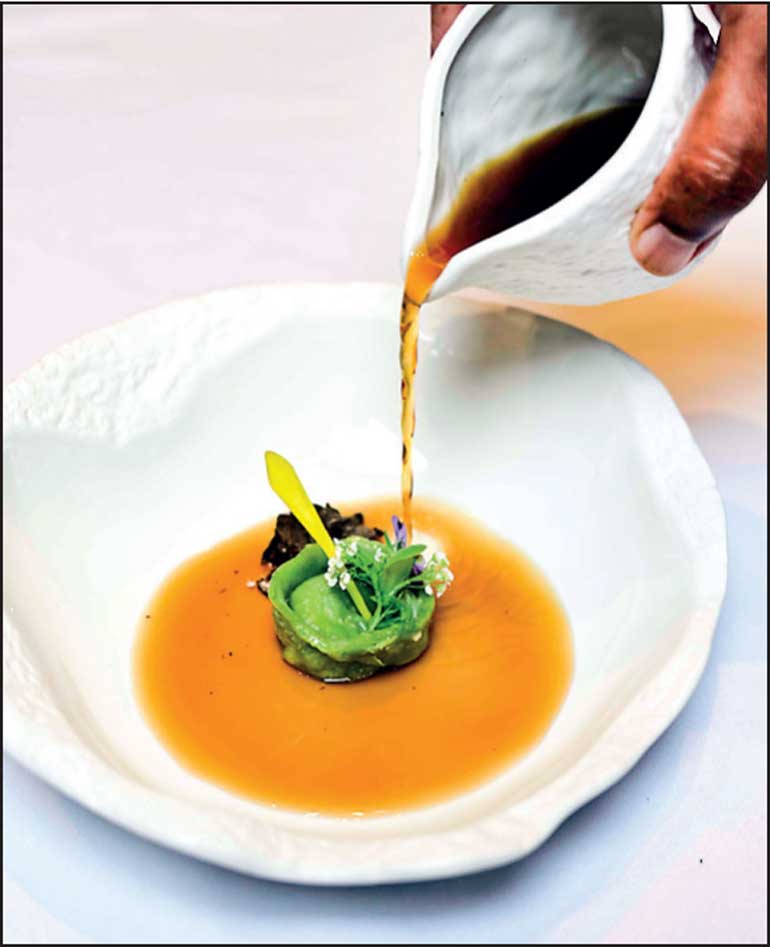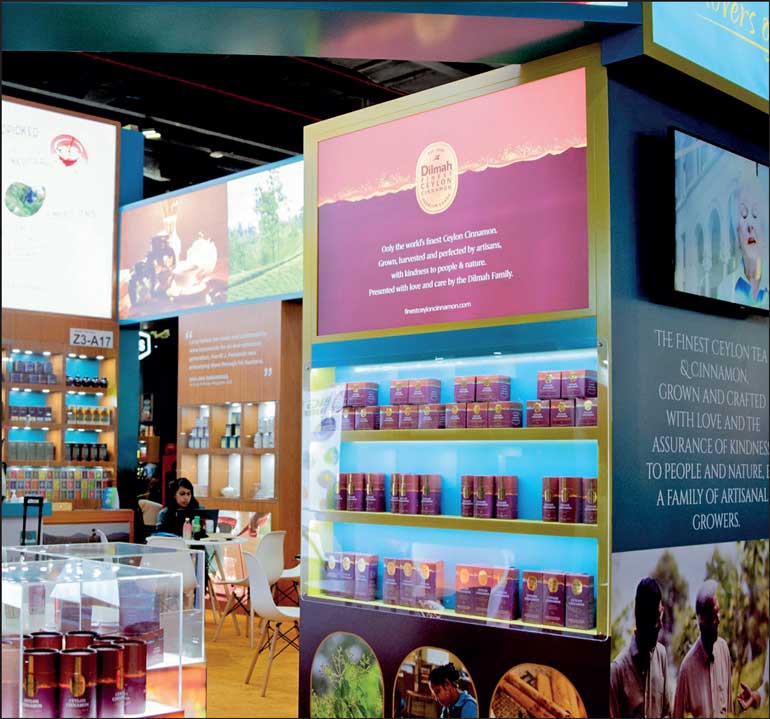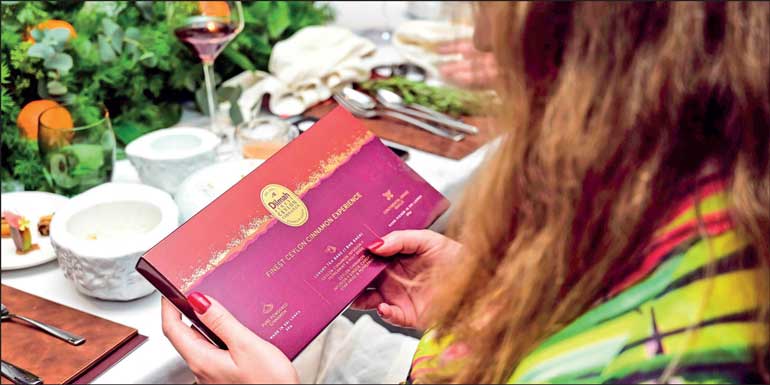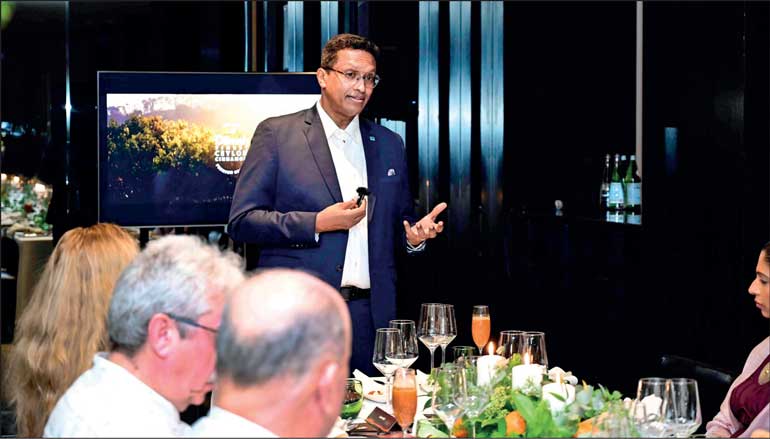Thursday Feb 19, 2026
Thursday Feb 19, 2026
Friday, 1 March 2024 00:25 - - {{hitsCtrl.values.hits}}

Ceylon Cinnamon infused
gastronomy

Presentation of Dilmah Cinnamon at Gulfood last week

A guest at the launch event admiring the Dilmah Ceylon Cinnamon Gift Pack

Presenting Dilmah Ceylon Cinnamon at the launch in Pullman Dubai
There’s always a lingering fragrance around the Dilmah complex in Colombo. It is generally woody, sometimes tinged with citrus, occasionally fruity, and always pleasant. That’s the aroma of tea, varying only as the seasons influence the teas. We taste over 10,000 teas each week in selecting only the finest teas for Ceylon’s finest so that lively aroma has always surrounded us, spurring us on in our mission to make the world a better tea since the time my father first started his journey in tea in the 1950s.
There’s been a difference recently, the woody fragrance complemented by subtle sweetness, an added warmth and majestic piquancy. That change marks the first time Dilmah has ventured beyond tea, with the cinnamon produced on its Kahawatte Plantations now offered in elegant cinnamon coloured packages, emblazoned with a golden logo declaring the contents, ‘Dilmah Finest Ceylon Cinnamon.’
There are natural parallels in the two iconic Sri Lankan products. Ceylon Tea and Ceylon Cinnamon are universally acclaimed the finest tea and cinnamon in the world, accolades that are linked to the richness of the island’s biodiversity, its monsoonal climate, the diverse ecosystems, soils and the sophistication of the island’s tradition of sustainable agriculture. Since 3 BC, Sri Lanka was ruled by kings who understood and embraced the natural synergy that should define interaction between people and nature. Colonialism interrupted that relationship although respect for nature and sustainability persists amongst many tea and cinnamon growers, adding to the allure of both.
Dilmah Tea was born in September 1985 with the assurance that, ‘In Ceylon a country famous for its tea, there is a tea famous for its taste,’ evolving to my father’s invitation in 1994 to tea drinkers to ‘do try it!’. My father, Merrill J. Fernando, passed away in July last year, yet the values he espoused through his lifetime of devotion to tea and kindness form the foundation of the legacy he leaves behind. A part of that legacy is a discussion we had on Ceylon Cinnamon and its potential to parallel the story of taste, goodness and ethical purpose in tea that my father devoted his life to. That discussion ended in a momentous decision to offer our Cinnamon, branded ‘Dilmah, Finest Ceylon Cinnamon.’
Next year, Dilmah Tea celebrates 40 years since its debut in 1985. My father devoted his life to tea, and since the early days of Dilmah when he and 18 others laboured to make his dream of the first producer owned tea brand, a reality, our vision and mission have focused on making the world a better tea. Our decision to offer Dilmah Ceylon Cinnamon was not taken lightly therefore; it was rooted in the knowledge that the heritage, flavour, goodness and ethical purpose in genuine Ceylon Cinnamon is one of the world’s greatest untold stories.
Ceylon Cinnamon is scientifically proven to be unique. Cinnamomum zeylanicum grown in other countries is not quite the same, as scientists have confirmed. That truth is indisputable but there is more to Ceylon Cinnamon. In 1000 BC King Solomon sent ambassadors to Sri Lanka, visiting the present day city of Galle which he called Tarshish, to purchase Ceylon Cinnamon, amongst other treasures which included precious gemstones. The heritage of Ceylon Cinnamon is perfectly expressed in the value ascribed to the spice by kings, queens, emperors, physicians and chefs over millennia.
Our reason for embracing Ceylon Cinnamon goes beyond taste and heritage. Dilmah is a family business, formed on a foundation of family values, chief among which is kindness. Sri Lanka’s magnificent cinnamon has been exploited for centuries with little or no benefit to the community engaged in its production or the future of the ancient cinnamon industry in Sri Lanka. The existence of a cheaper, inferior counterfeit that unfairly acquired the allure of cinnamon forced Ceylon Cinnamon into a defensive mindset, compromising the heritage, tradition, taste and goodness in the spice. The reality that cassia, the imitator contains the toxic substance coumarin, adds urgency to our mission.
Our Ceylon Cinnamon was first presented to guests at an evening of gastronomy inspired by the fragrance and flavour of Ceylon Cinnamon in Dubai on 17 February 2023. At the event guests were presented with an exceptional and different experience of the Spice of Kings. In combination, our passion for Ceylon’s Cinnamon, its unique taste, our life enhancing purpose in cinnamon and the culinary art of Pullman Dubai Chefs Roziro Mathias and Dammika Herath, delivered insight into the taste, goodness and purpose of Dilmah Finest Ceylon Cinnamon.
An amuse bouche of Langouste tortellini with vegetable consomme infused with Ceylon Cinnamon and white truffle, fig chutney and caramelised pears paired with Ceylon Cinnamon Infused Dilmah prince of Kandy Tea. Our entrée was Risotto Alberto with Ceylon Cinnamon infused Wild Asparagus veloute, brie cheese curd and a garnish of gold leaf. Thereafter butter-poached Ceylon Cinnamon dusted wild cod, royal Beluga caviar, caramelised endive, edemame puree and a blood orange glaze. Following a palate cleanser of Ceylon Cinnamon essence in spring water combined with Granny Smith Granita, came a slow roasted veal loin with Ceylon Cinnamon infused herb jus, chive polenta stuffed morel. Finally a trio of dessert, with Ceylon Cinnamon infused chocolate ganache, Ceylon Cinnamon Jelly dome, Warm Lemon cake with vanilla cream, mango mousse and hazelnuts caramelised in Ceylon Cinnamon and Ceylon Cinnamon infused chai.
Entitled ‘Finest Ceylon Cinnamon Experience’ the event heralded the first serving of Dilmah Ceylon Cinnamon and the trade launch of our Cinnamon at Gulfood 2024.
Too many great agricultural industries are built on a foundation of poverty. The transition from colonial to free market economy failed – in most cases – to free growers of coffee, cocoa, tea and many other crops. The extractive and exploitative colonial economic system is too often superseded by traders whose insistence on price, driven by a ruthless discount culture, drive down the incomes of growers, crushing innovation, education and motivation, eventually destroying livelihoods and industries. For genuinely fair trade, fair by customers and fair by producers, quality, integrity, sustainability, innovation and a genuine commitment to ethics are all important.
In the case of cinnamon, an entire industry was compromised by a misconception perpetrated by traders of cassia, who forced artisanal cinnamon growers to compete with the much cheaper and inferior spice. That has compromised the benefit that the goodness in Ceylon Cinnamon offers a world suffering from the chronic diseases that it has potent therapeutic effects against. That unfair competition has also marginalised generations of cinnamon growers and peelers who have not benefited from the true value of their produce.
As a family with a commitment to the finest Ceylon Tea and the finest Ceylon Cinnamon, we will continue therefore to fulfil my father’s vision, to serve humanity through our business. We will do that through our mission to offering great Taste, natural Goodness and ethical Purpose in our teas and cinnamon.
(The writer is Chairman, Dilmah Ceylon Tea Company PLC.)